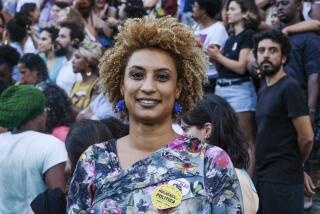Brazil’s Visiting Paramedics Making Inroads Against Infant Mortality : Public health: A baby saved from early death symbolizes the progress made in a poor, water-short state.
- Share via
FORTALEZA, Brazil — Raquel Urculino was 6 weeks old when she was rescued from becoming another infant-mortality statistic.
Abandoned by her mother and quickly losing weight, Raquel could have easily become another of the one in 10 babies born in the state of Ceara, in chronically drought-stricken northeastern Brazil, who die in the first year of life.
Behind Raquel’s survival were a loving woman, an involved Catholic Church and a government health program that has cut the infant-death rate in Ceara 32% in three years, from 95 deaths per 1,000 infants to 65. The United Nations Children’s Fund, in its report for 1992, singled out Ceara’s as one of the health programs worldwide that “show what can be done” for children of the poor.
Ceara, population 6.3 million, has managed to blend frugal fiscal practices with effective social programs.
When Raquel was born in May, 1989, she was jaundiced and weighed less than five pounds. Her mother, who had no means of support, left her in the hospital and fled. After six weeks of haphazard care in the hospital, Raquel’s weight had dropped to a little over four pounds and her skin hung loose on her tiny bones like an elderly woman’s.
The hospital placed Raquel in the care of Rita Da Costa Urculino, a volunteer in a statewide Catholic Church program that advises mothers on caring for themselves and their babies.
The lessons were simple: regular checkups during pregnancy, basic hygiene, six months of breast-feeding, complete vaccinations and oral rehydration if the baby gets diarrhea.
In addition to Raquel, Urculino saw 10 other babies every day on house calls in a seaside Fortaleza slum. These babies were wasted by dehydration, on diets of watery powdered milk. Some had diseases such as polio or tetanus.
“The children here are so malnourished there’s no place to put them at the bottom of the growth charts,” Urculino said. With homemade serum and breast milk collected from neighbor mothers, Urculino, 51, restored Raquel to health. Although she and her husband already had 12 children of their own, they eventually adopted her.
The Catholic Church effort, started in 1985 and still going strong, served as a model for a state health program begun during a ruinous dry spell in 1987. Federal emergency funds were used to pay “health agents” to teach basic preventive health care house to house. Today, 6,000 agents are working in all but a few townships in Ceara.
Why the state program worked so well has more to do with politics than medicine. When businessman Tasso Jereissati was elected governor in 1986, the bureaucracy, larded with unproductive employees, was collapsing. And public health was not being addressed successfully.
The first cause of infant deaths was simple diarrhea. Although Ceara was last among Brazil’s 26 states in tuberculosis vaccination, stockpiles of vaccine were going bad in boxes in Fortaleza, the capital.
“Our biggest enemy was patronage politics,” Jereissati said. In 1982 an earlier governor hired 42,000 people in one 48-hour period, right before an election.
Jereissati fired 40,000 people in his first days in office. When it came to basic health, he wanted a low-cost, apolitical program. “We took only people who had shown a vocation for health care and were not linked with any professional politician,” he said.
“They broke all the rules. Normally, anywhere in Latin America when you talk about a job, you get the friend of a friend of someone in politics. In this case, the program was totally free to choose the community leaders who were most qualified,” said Ennio Svitone, a UNICEF representative in Ceara.
Town mayors were furious that their pet job candidates were ignored. Many broke with Jereissati, and one brandished a pistol in the face of a nurse. Jereissati, limited by law to one term, left office last year.
The public health agents, mostly young women, quickly saw results. “At first, people thought it was just politicking and would be over as soon as the drought campaign ended,” said 33-year-old agent Lidoin Macedo. “Now, they can see that their children are better.”
Training of health agents is brief, sometimes just two weeks, although some women already were experienced midwives or herbal healers. In the field, every agent works in her or his home township and keeps track of about 150 families through regular home visits.
In some townships, families are widely dispersed and agents must walk whole days to reach them. Whenever a child dies, the health agent is responsible for reporting and explaining the death to the health ministry--especially if the killer is a disease that is preventable by vaccination.
In their knapsacks the agents carry portable scales to make weight charts for infants, as well as oral-rehydration salts and first aid materials. They monitor the diets of pregnant women and teach them to enrich their food with flour made from egg shells and mango pits.
Progress to date: number of child deaths due to diarrhea down by a third; infant malnutrition down by a third; no new case of polio in recent years. And Ceara is one of the top four Brazilian states in tuberculosis vaccinations.
More to Read
Sign up for Essential California
The most important California stories and recommendations in your inbox every morning.
You may occasionally receive promotional content from the Los Angeles Times.













